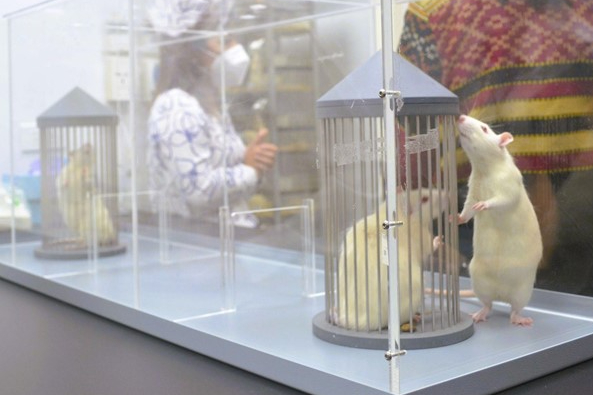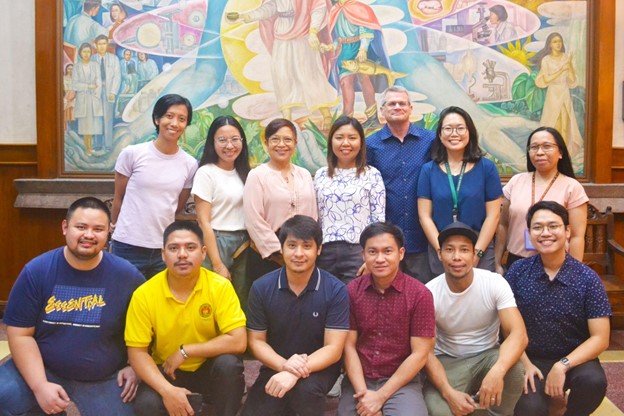UP embarks on pioneering study into ‘Rugby’ abuse
Published: April 28, 2023
By: Timothy James M. Dimacali
Scientists from across the University of the Philippines (UP) are pioneering a first-of-its-kind multidisciplinary study into the chemical, physical, and psychological impacts of solvent abuse on the country’s thousands of so-called “Rugby boys and girls.”

Novel Approaches to Treatment of Addiction and Depression using Animal Models is a three-year research program spearheaded by the UP Manila National Institutes of Health (UPM-NIH), the National Center for Mental Health, the UP College of Medicine, the UP Philippine General Hospital, and the UP Diliman College of Science Institute of Chemistry (UPD-CS IC). It is being supervised by internationally-renowned neurobehavioral scientist Dr. Gregory Quirk of the University of Puerto Rico School of Medicine.
“Attempts to treat toluene or ‘Rugby’ addiction have been largely unsuccessful due to severe withdrawal and craving symptoms that trigger relapse. What is needed to help adolescents overcome their addictions are new treatments that reduce toluene withdrawal and craving,” said program leader Dr. Rohani Cena-Navarro of the UPM-NIH.
“Rodent models have been used to develop such pharmacological treatments for other addictive drugs, but no such model has been developed for toluene. This collaboration between scientists and clinicians hopes to address this societal problem using laboratory animals,” she added.
This research is being supported by the Department of Science and Technology – Philippine Council for Health Research and Development (DOST-PCHRD).
Origins of the nation’s thousands of ‘Rugby boys and girls’
The densely-populated urban streets of the Philippines are home and playground to as many as one million street children, many of whom are adolescents from the poorest families or even abandoned by parents. Left to fend for themselves, many turn to substance abuse to alleviate their hunger by inhaling toluene—an aromatic hydrocarbon solvent found in cheap and easily-obtainable contact cement, popularly sold under the “Rugby” brand name in local hardware stores.
Estimated to number in the thousands nationwide, these young people eventually develop a physiological addiction and resort to begging, scavenging, or stealing not only to quell their hunger but also to sustain their toluene addiction. Seeing groups of young boys—and girls!—running around the streets sniffing bags of glue has become so commonplace to the ordinary Filipino citizen, that the colloquial term “Rugby boys” is now a widely-used pejorative.
Substance abuse among street children is a long-standing societal issue that requires proper public health intervention. Acknowledging the need for local research to tackle inhalant abuse among adolescents will be very significant in providing recommendations and strengthening ongoing support systems, policies, and interventions.
Addressing social issues and sex differences
So where does science fit into this societal issue? This is exactly what this team of researchers hopes to achieve by developing the first Addiction Research Laboratory in the country, using animal models.
“In the years to come, it is our hope that the establishment of this Addiction Research Program will further open opportunities for research addressing the craving and withdrawal stages of addiction,” said UPD-CS IC’s Dr. Grace Gregorio, who is researching how toluene affects rats in an effort to understand the solvent’s effects on people.
She and her fellow researchers are also looking into sex differences in the effects of toluene exposure, which represents a novel approach that has never been done before. “I bring in my analytical chemistry expertise to this meaningful undertaking by measuring toluene levels in the blood of male and female rodents,” Dr. Gregorio said.
“There is much that we, as a society, don’t know and understand about solvent abuse. One of our research specialists, Jariel Bacar, rightly points out that girls can be affected too—and in very different ways from boys. The project is looking into what these differences are,” she explained.
Developing tailored treatments for solvent-addicted adolescents
The first-ever model of its kind for toluene-based solvent addiction in the Philippines, this research is paving the way for new treatments for overcoming withdrawal and craving. The team hopes to translate their findings for use in human subjects as an attempt in addressing the pervasive drug addiction and chronic relapse in individuals. Such experimental treatments for toluene have not been deeply investigated anywhere else in the world, because inhalant abuse is not as rampant in more developed countries.
Now in its second year, the project has already completed its first two phases: identifying validated methods to quantify toluene in rodent blood and establishing the long-term effects of toluene after chronic exposure. Using validated methods, the team is investigating the effects of chronic exposure that last long after the drug has been stopped. These include increased craving for the drug, increased anxiety, and impaired social functioning, all of which increase the likelihood of relapse following treatment. Novel treatments will be tested to diminish these withdrawal symptoms and restore the brain to its pre-addiction state.
Ultimately, Novel Approaches to Treatment of Addiction and Depression using Animal Models aims to address one of the greatest challenges faced by today’s researchers: interweaving science into the fabric of a complex, busy, and highly diverse society to serve its well-intended purpose to the community that needs it the most. By the end of the project, the researchers hope to have developed tailored treatments for boys and girls who are addicted to toluene.

For interview requests and more information on the multidisciplinary research program, Novel Approaches to Treatment of Addiction and Depression using Animal Models, please contact media@science.upd.edu.ph
